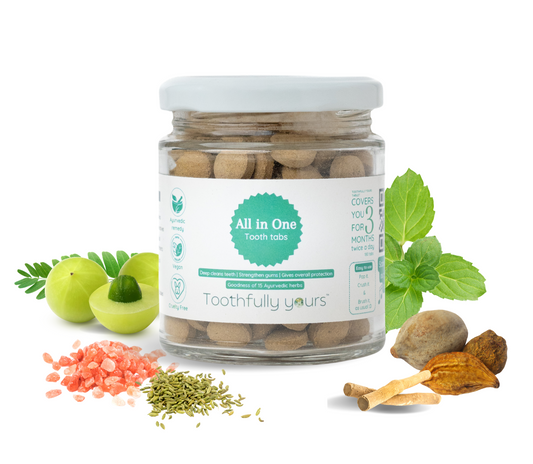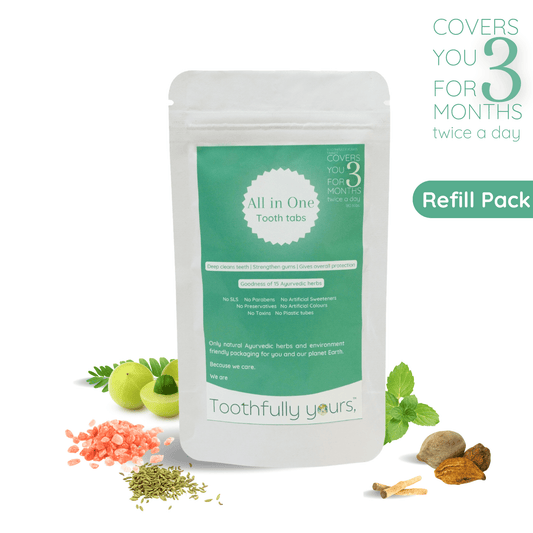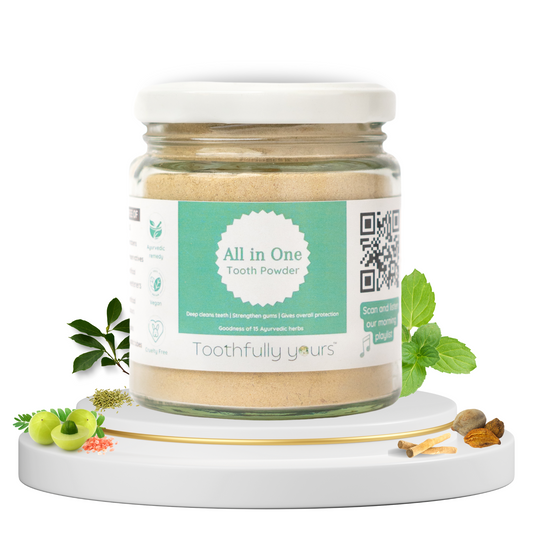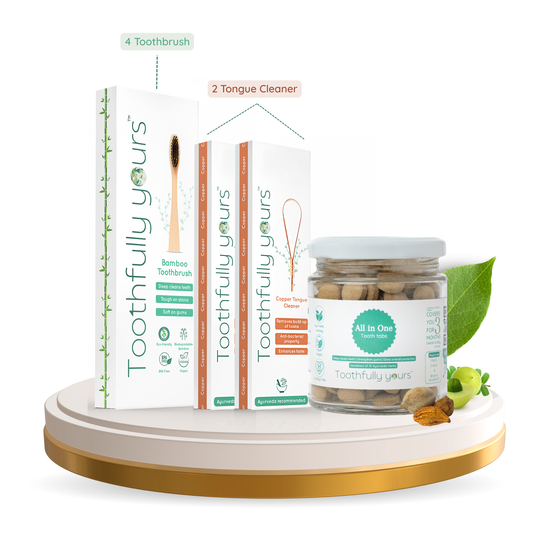
Understanding Gum inflammation and bleeding: Causes, Prevention, and Care Tips
Gums, or gingiva, are soft tissues that surround and support the teeth. They serve as a protective barrier against bacteria and provide stability to the teeth. Healthy gums are firm, and do not bleed during brushing or flossing. However, when gums become inflamed or infected, they may bleed easily, indicating an underlying issue.
Bleeding gums, medically known as gingival bleeding, can be a sign of underlying oral health issues and should not be ignored. In this blog post, we'll explore the anatomy of gums, common causes of gum inflammation and bleeding, preventive measures, and effective care tips to maintain optimal oral health.
Causes of Gum Inflammation and Bleeding:
- Poor Oral Hygiene: Inadequate brushing and flossing can lead to the buildup of plaque and tartar along the gum line, causing inflammation and bleeding gums.
- Gum Disease: Gingivitis, the early stage of gum disease, is characterized by swollen gums that bleed easily. If left untreated, gingivitis can progress to periodontitis, a more severe form of gum disease that can lead to tooth loss.
- Hormonal Changes: Hormonal fluctuations during puberty, pregnancy, or menopause can increase blood flow to the gums, making them more susceptible to inflammation and bleeding.
- Medications: Certain medications, such as blood thinners and antihypertensives, can interfere with the blood's ability to clot properly, leading to gum bleeding.
- Poor Nutrition: A diet lacking in essential nutrients, such as vitamin C and vitamin K, can weaken the immune system and compromise gum health, increasing the risk of bleeding gums.
Preventive Measures:
- Maintain Good Oral Hygiene: Brush your teeth at least twice a day and floss daily to remove plaque and bacteria from between the teeth and along the gum line.
- Use a Soft-Bristled Toothbrush: Choose a toothbrush with soft bristles to avoid irritating the gums and causing further inflammation.
- Rinse with Mouthwash: Use a potent herb infused mouthwash to help reduce plaque and bacteria in the mouth and promote gum health.
- Eat a Balanced Diet: Consume a diet rich in fruits, vegetables, and lean proteins to provide essential nutrients for gum health.
- Avoid Tobacco Products: Smoking and chewing tobacco can increase the risk of gum disease and exacerbate gum inflammation and bleeding.

Care Tips for Bleeding Gums:
- Be Gentle: Avoid brushing too vigorously or using a hard-bristled toothbrush, as this can further irritate inflamed gums and cause bleeding.
- Schedule Regular Dental Check-ups: Visit your dentist regularly for professional cleanings and exams to detect and treat gum disease in its early stages.
- Use Gum-Healing Remedies: Apply aloe vera gel or a saltwater rinse to soothe inflamed gums and promote healing.
- Consider Herbal Remedies: Herbs like sage, chamomile, and calendula have anti-inflammatory properties that can help reduce gum inflammation and bleeding.
- Practice Stress Management: Chronic stress can weaken the immune system and increase the risk of gum disease. Practice relaxation techniques such as deep breathing, meditation, or yoga to reduce stress and improve gum health.
Gum inflammation and bleeding, known as "danta vrana" in Ayurveda, are often caused by an imbalance in the body's doshas, particularly the Pitta and Vata doshas. Here's how gum issues occur according to Ayurveda and some natural remedies to address them.
Dosha Imbalance:
- Pitta Imbalance: Excessive intake of spicy, sour, and acidic foods can aggravate the Pitta dosha, leading to inflammation and irritation in the gums. Pitta imbalance can manifest as redness, swelling, and bleeding of the gums.
- Vata Imbalance: Dryness and instability in the body, characteristic of Vata imbalance, can cause gum recession, sensitivity, and increased susceptibility to inflammation and infection.
Foods to Avoid:
- Spicy Foods: Foods with a pungent taste, such as chili peppers, garlic, and onions, can aggravate the Pitta dosha and irritate the gums, leading to inflammation and bleeding.
- Acidic Foods: Citrus fruits, tomatoes, and vinegar-based foods can erode tooth enamel and irritate the gums, making them more prone to inflammation and bleeding.
- Hard Foods: Crunchy or hard foods like popcorn, nuts, and hard candies can traumatize the gums and cause micro-tears, leading to gum irritation and bleeding.
Herbs and Remedies:
- Triphala: Triphala, a combination of three fruits (amla, haritaki, and bibhitaki), is a potent Ayurvedic remedy for gum inflammation and bleeding. It helps reduce inflammation, strengthen the gums, and promote oral health. Gargling with triphala decoction or applying triphala powder to the gums can help alleviate symptoms.
- Neem (Azadirachta indica): Neem is renowned for its antimicrobial and anti-inflammatory properties, making it effective in treating gum issues. Chewing on neem leaves or using neem-based toothpaste and mouthwash can help reduce inflammation and prevent gum bleeding.
- Licorice (Glycyrrhiza glabra): Licorice root contains soothing and anti-inflammatory compounds that can help calm inflamed gums and promote healing. Chewing on licorice root or using licorice-based toothpaste can provide relief from gum irritation and bleeding.
Ayurvedic Dental Care Practices:
- Oil Pulling: Swishing sesame oil or coconut oil in the mouth for 10-15 minutes daily can help remove toxins, bacteria, and plaque from the gums and teeth, reducing inflammation and promoting gum health.
- Herbal Mouth Rinse: Gargling with herbal decoctions made from herbs like neem, triphala, and licorice can help soothe inflamed gums, reduce bleeding, and support overall oral hygiene.
- Gentle Massage: Massaging the gums with herbal oils like sesame oil or ghee can improve circulation, reduce inflammation, and strengthen the gums.
Incorporating these Ayurvedic remedies and practices into your daily oral care routine can help maintain healthy gums, prevent inflammation and bleeding, and promote overall oral health.
FAQs:
What is the best toothpaste for Gum Inflammation and bleeding?
There are many products, toothpaste or tooth powder in the market which claims to solve gum related issues, but regardless of the claims, as always we would advise first to check the ingredient list. Ingredient is the king.
One can always take the Ayurveda route and use herbs like, as mentioned above, like Triphala, Neem, Licorice, Mango leaf and powder them, mix them with Rock Salt and Turmeric and use it as tooth powder to clean the teeth and maintain the oral hygiene. Or even you can try our All in One Tooth Tabs, which made using 15 Ayurvedic herbs and minerals to give complete protection to your teeth and gums and fight bad breath. Check this guide on how to use tooth tablets?
Bleeding gums should not be ignored, as they can be a sign of underlying gum disease or other oral health issues. By understanding the causes of gum inflammation and bleeding and implementing preventive measures and care tips, you can maintain healthy gums and prevent complications. Remember to prioritize good oral hygiene, regular dental check-ups, and a balanced diet to support gum health and overall well-being. If you experience persistent gum bleeding or other oral health concerns, consult with your dentist for proper evaluation and treatment.

Oral Care routine your smile deserves.
Ayurveda's remedies with highly effective herbs and nothing else.
Check Now →




